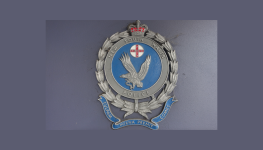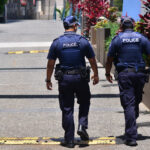Father of Two Shot Dead by NSW Police Officer

An internal investigation is underway into the actions of police officers stationed at the small town of Tenterfield in Northern New South Wales, after a man was shot dead there earlier this week.
The State Crime Command (SCC) will conduct the investigation, overseen by the Law Enforcement Conduct Commission (LECC).
Shot dead by police
It has been reported the 48-year old father of two walked into Tenterfield Police Station on Thursday evening at about 6pm and pointed a firearm at an officer, before the officer pulled out his own and shot him.
Police say they attempted to perform CPR on the man, and paramedics who attended thereafter tried to do the same, but he died at the scene.
Killing in a small town
Tenterfield is a small town with a population of less than 5,000 and only a small police force. Most long-term residents are known to each other in some way or another.
The close-knit community is now in shock and the Mayor has promised to dedicate all resources possible to help people access mental health support in the wake of the incident.
It’s not known at this stage how many police officers discharged their weapons or how many rounds of ammunition were fired. The critical incident investigation will seek to determine the circumstances that led to police killing, why the man was at the police station and the moments that led to him being shot.
The investigation will also consider the use of police weapons more broadly.
Police and the use of lethal weapons
The use of firearms is not a new debate, but it has heated up in recent years as the number of deaths caused by police officers steadily rises, not just in New South Wales, but across the nation.
Vital questions need to be answered around the use of lethal and non-lethal weapons and there is always an opportunity to review policies and procedures.
In Australia, police officers are trained (and regularly receive updated training) to use weapons as a measure of last resort. If there is an imminent threat, police can shoot in self-defence provided that this is a reasonable response to that threat.
Police are required to make an assessment of risk factors, and this is not always straightforward in tense situations where snap decisions need to be made, however there is growing concern that the threshold for proof to justify the use of lethal weapons by police is too low.
NSW Police have also been heavily criticised in recent times for heavy-handed and ‘excessive force’ tactics during general policing and arrest, as well as, in some cases, an ‘above the law’ mentality.
In December, two NSW Police officers had their weapons confiscated after a photo emerged of them using their guns to pose for social media. The photo, which apparently appeared on the social media platform BeReal shows one of the officers holding a pistol to his head as his female colleague takes aim with her own gun.
The idea behind ‘BeReal’ is that users post pictures of exactly what they are doing at the time.
The actions of the officers resulted in an internal investigation – both were put on administrative duties and had their weapons confiscated.
Critical Incident Investigations
Internal investigations are typically conducted when an officer is accused of misconduct, or there has been a complaint about police actions that it determined not to be overly serious.
In all major incidents – which has resulted in a serious injury or a death, a critical investigation is launched.
These are governed by the Law Enforcement Conduct Commission Act 2016 which describes a critical incident as one that “results in the death of, or serious injury to, a person (including another police officer) and “the death or serious injury:
(i) arises from a discharge of a firearm by the member involved, or
(ii) arises from the use or operation of defensive equipment by the member involved, or
(iii) arises from the application of physical force by the member involved while exercising any function as a police officer, or
(iv) arises from the use of a police vehicle by the member involved (including its use as a passenger),
Or
(v) arises while the person is in custody or while escaping or attempting to escape from custody, or
(vi) appears to be likely to have resulted from any police operation.
A Regional Commander can also declare a critical incident investigation under other grounds, such as that it is in the public interest to do so.
Aspects which come under the microscope during a critical incident investigation include”:
- The lawfulness and reasonableness of police actions.
- The extent to which police complied with relevant legislation and policies, practices and procedures.
- Complaints or other evidence of misconduct.
The LECC: A starving dog without teeth
The Law Enforcement Conduct Commission – the police watchdog in New South Wales – can ‘oversee and monitor’ the investigation of critical incident investigations in our state.
One of its objectives is to provide “assurance to the public and the next of kin that police investigations into critical incidents are conducted in a competent, thorough and objective manner.”
However, it is important to be aware the organisation is extremely under resourced and has no power whatsoever to discipline let alone bring criminal charges against any police officer.
In fact, it only investigates 2% of the thousands of complaints made against NSW police officers each year, and can only make recommendations regarding discipline and/or prosecution.
Police policing policies
So at the end of the day, police in New South Wales essentially police themselves, despite years of calls for the establishment of an independent and properly resourced body with the power to discipline and bring criminal charges against police officers.
There will, however, ultimately be a coronial inquest into the man’s death, which will rely on statements from police.







